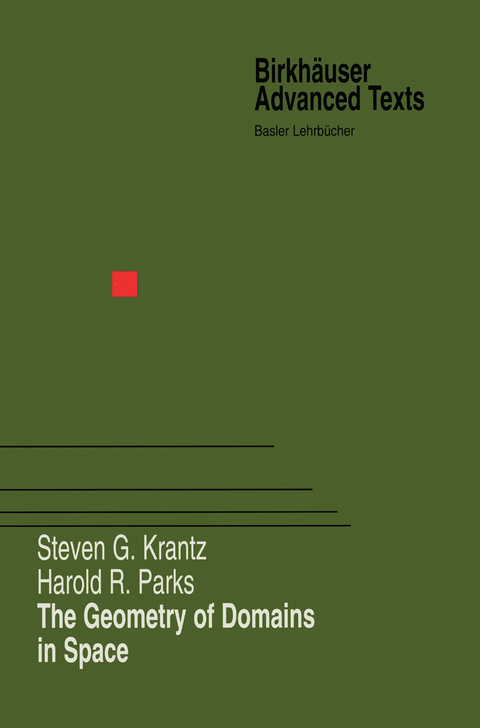
The Geometry of Domains in Space
Birkhauser Boston Inc (Verlag)
978-0-8176-4097-2 (ISBN)
The analysis of Euclidean space is well-developed. The classical Lie groups that act naturally on Euclidean space-the rotations, dilations, and trans lations-have both shaped and guided this development. In particular, the Fourier transform and the theory of translation invariant operators (convolution transforms) have played a central role in this analysis. Much modern work in analysis takes place on a domain in space. In this context the tools, perforce, must be different. No longer can we expect there to be symmetries. Correspondingly, there is no longer any natural way to apply the Fourier transform. Pseudodifferential operators and Fourier integral operators can playa role in solving some of the problems, but other problems require new, more geometric, ideas. At a more basic level, the analysis of a smoothly bounded domain in space requires a great deal of preliminary spadework. Tubular neighbor hoods, the second fundamental form, the notion of "positive reach", and the implicit function theorem are just some of the tools that need to be invoked regularly to set up this analysis. The normal and tangent bundles become part of the language of classical analysis when that analysis is done on a domain. Many of the ideas in partial differential equations-such as Egorov's canonical transformation theorem-become rather natural when viewed in geometric language. Many of the questions that are natural to an analyst-such as extension theorems for various classes of functions-are most naturally formulated using ideas from geometry.
1. Elementary Topics.- 1.1 Smooth Functions.- 1.2 The Concept of Defining Function.- 1.3 Measure Theory.- 2. Domains with Smooth Boundaries.- 2.1 The Tangent Bundle and Normal Bundle of the Boundary.- 2.2 The Second Fundamental Form and Curvature.- 2.3 Surfaces with Constant Mean Curvature.- 3. Measures.- 3.1 The Carathéodory Construction.- 3.2 Rectifiability.- 3.3 Minkowski Content.- 3.4 A Space-Filling Curve.- 3.5 Covering Lemmas.- 3.6 Functions of Bounded Variation.- 3.7 Domains with Finite Perimeter.- 3.8 The Area Formula.- 3.9 The Co-Area Formula.- 4. Sobolev Spaces.- 4.1 Basic Definitions and Results.- 4.2 Restriction and Trace Theorems for Sobolev Spaces.- 4.3 Domain Extension Theorems for Sobolev Spaces.- 5. Smooth Mappings.- 5.1 Sard’s Theorem.- 5.2 Extension Theorems.- 5.3 Proof of the Whitney Extension Theorem.- 5.4 Application of the Whitney Extension Theorem.- 5.5 Multidimensional Versions of the Fundamental Theorem of Calculus.- 6. Convexity.- 6.1 The Classical Notion of Convexity.- 6.2 Other Characterizations of Convexity.- 6.3 Exhaustion Functions.- 6.4 Convexity of Order k.- 7. Steiner Symmetrization.- 7.1 Basic Properties.- 7.2 The Isodiametric, Isoperimetric and Brunn-Minkowski Inequalities.- 7.3 Equality in the Isoperimetric Inequality.- 8. Topics Related to Complex Analysis.- 8.1 Quasiconformal Mappings.- 8.2 Weyl’s Theorem on Eigenvalue Asymptotics of a Domain in Space.- A.1. Metrics on the Collection of Subsets of Euclidean Space.- A.2. The Constants Associated to Euclidean Space.- Guide to Notation.
| Erscheint lt. Verlag | 1.5.1999 |
|---|---|
| Reihe/Serie | Birkhäuser Advanced Texts Basler Lehrbücher |
| Zusatzinfo | X, 309 p. |
| Verlagsort | Secaucus |
| Sprache | englisch |
| Maße | 170 x 244 mm |
| Themenwelt | Mathematik / Informatik ► Mathematik ► Analysis |
| Mathematik / Informatik ► Mathematik ► Angewandte Mathematik | |
| Mathematik / Informatik ► Mathematik ► Geometrie / Topologie | |
| ISBN-10 | 0-8176-4097-5 / 0817640975 |
| ISBN-13 | 978-0-8176-4097-2 / 9780817640972 |
| Zustand | Neuware |
| Haben Sie eine Frage zum Produkt? |
aus dem Bereich


